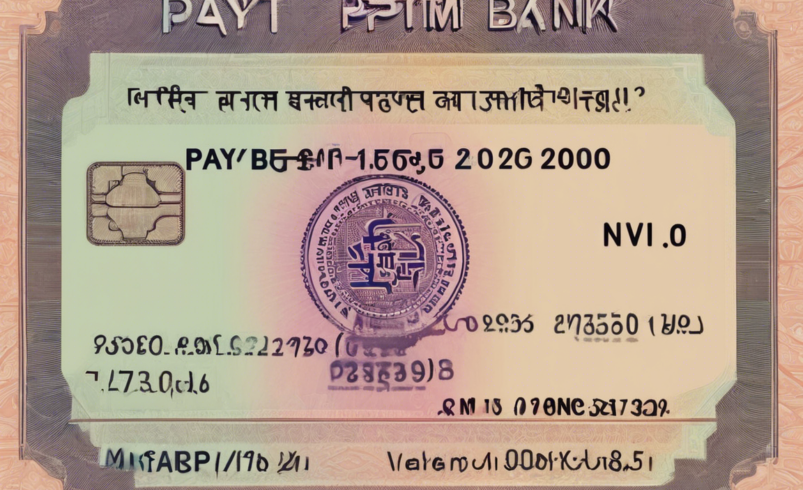As one of the leading mobile payments and financial services platforms in India, Paytm has become a household name, especially with the introduction of Paytm Payments Bank. However, with the increasing popularity of digital banking services, it is essential to understand the regulatory framework that governs such entities. In this article, we will explore the regulations set forth by the Reserve Bank of India (RBI) regarding Paytm Payments Bank, its operations, and the implications for users.
Understanding Paytm Payments Bank
Paytm Payments Bank is a digital bank that functions primarily through its mobile application, providing users with various banking and financial services such as savings accounts, debit cards, online transactions, and more. Users can access these services without the need for physical branches, making it a convenient and accessible option for many Indians.
RBI Regulations on Paytm Payments Bank
Licensing and Operations
Paytm Payments Bank operates under the regulatory purview of the Reserve Bank of India, which granted it a banking license. As per RBI guidelines, payments banks have limitations compared to traditional banks, such as restrictions on lending money and issuing credit cards. These banks can accept deposits up to a certain limit and provide interest on these deposits.
Deposit Limits and Interest Rates
One of the key regulations imposed by the RBI on payments banks like Paytm is the restriction on the maximum deposit amount. Payments banks are not allowed to hold more than a certain limit in a user’s account, currently set at Rs. 1 lakh per customer. Moreover, these banks are required to provide interest on deposits, although the interest rates are usually lower than those offered by traditional banks.
Financial Inclusion and Accessibility
A primary objective of establishing payments banks in India was to promote financial inclusion by reaching remote and underserved areas with limited access to traditional banking services. Paytm Payments Bank, along with other similar entities, plays a crucial role in achieving this goal by leveraging technology to provide banking services to a broader population.
Data Security and Customer Protection
RBI regulations also mandate strict data security and customer protection measures for payments banks. These entities must ensure the safety and confidentiality of user data, adhere to cybersecurity protocols, and implement robust fraud detection mechanisms to safeguard customer interests.
Compliance and Reporting Requirements
As regulated entities, payments banks like Paytm are required to comply with various reporting and disclosure norms prescribed by the RBI. This includes submitting periodic reports on their financial health, operational activities, and adherence to regulatory guidelines. Non-compliance with these requirements can lead to penalties and regulatory action.
User Experience and Benefits
While stringent regulations govern the operations of Paytm Payments Bank, users can benefit from a range of services and features offered by the platform. Some of the key advantages include:
- Convenience: Access banking services anytime, anywhere through the mobile app.
- Low Transaction Costs: Enjoy low or zero transaction fees for various financial transactions.
- Quick and Easy Account Opening: Simplified account opening process compared to traditional banks.
- Digital Payments: Seamlessly conduct online transactions, bill payments, and more.
- Interest on Savings: Earn interest on deposited funds, albeit at a lower rate compared to regular banks.
Common FAQs on RBI Regulations for Paytm Payments Bank
1. Are deposits in Paytm Payments Bank safe?
Yes, deposits in Paytm Payments Bank are protected as per regulatory guidelines, and the bank is mandated to adhere to strict security and customer protection measures.
2. Can I exceed the maximum deposit limit of Rs. 1 lakh in my Paytm Payments Bank account?
No, as per RBI regulations, payments banks cannot hold deposits exceeding Rs. 1 lakh per customer.
3. What are the interest rates offered by Paytm Payments Bank?
Paytm Payments Bank provides interest on savings account deposits, albeit at a lower rate compared to traditional banks. The current rates are subject to change as per regulatory requirements.
4. How does Paytm Payments Bank ensure data security for its users?
Paytm Payments Bank implements robust data security protocols, encryption techniques, and cybersecurity measures to protect user data and privacy.
5. Can I withdraw cash from my Paytm Payments Bank account at ATMs?
Yes, Paytm Payments Bank provides users with the option to withdraw cash from ATMs using their debit cards, subject to certain limits and charges.
As a regulated entity under the purview of the RBI, Paytm Payments Bank operates within a defined framework aimed at ensuring financial stability, consumer protection, and inclusive growth. By understanding these regulations and the associated benefits, users can make informed decisions regarding their banking needs and digital payment preferences.






